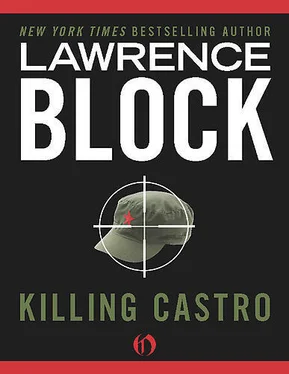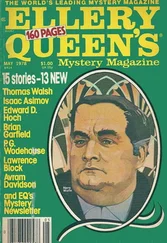It seemed unfair.
It was late when he fell asleep. In the morning he awoke when the sun struck his eyes. He got to his feet, made himself a quick breakfast, and left the area.
The last survivor. Now he had to go on, to kill and kill and kill. The cancer was a strong pain over his heart—it would not let him live long, and soon he could stop killing and fighting and running. Soon the cancer would kill him, or the Castristas would kill him. From one side or another, death would come.
When it did, it would be a release.
No man in history ever had an easier time taking power than did Fidel Castro when Batista fled the country leaving him the keys to the kingdom. Castro had, from the beginning, the one ingredient Batista never attained in all his years of despotism. He had the people behind him.
There were dissident elements. The political henchmen who had grown fat under Batista did not welcome the bearded rebel, certainly. And the very rich—the large landowners, the growers of tobacco and sugar—knew that Castro’s regime would mean a financial loss to them. But the people of Cuba, the lawyers and the doctors and the shopkeepers and the students and the workers and the peasants, backed the revolution all the way. Castro was their leader and they were his people.
It is not easy to become hated by people who love you. It is not a simple matter to switch positions entirely, so that those who supported you once now seek to destroy you. Castro did not do this all at once. He did not even manage it entirely.
American support went first. The United States was quick to distrust Castro—and with good reason. His several reforms too soon became just another form of oppression. True, some peasants did get land, some efforts were made in the direction of combating the problem of poverty. But with those reforms came oppressions and seizures of people and property that equaled Batista’s earlier brutalities.
Fidel could have changed American popular opinion, but the years in the hills had not made a subtle compromiser out of him. Charging forward like an enraged, clumsy bull might work in guerrilla warfare, but he tried to apply that method to international diplomacy.
The United States was used as the excuse and cause for every failing in Cuba, the germ responsible for every last one of the island’s ills. Castro shouted that Batista’s men had held power at the wheels of American tanks, firing American guns and dropping bombs from American planes. He brought truths, half-truths and lies together in such a way that Cuban popular opinion quickly turned anti-American. But the price of this was the friendship of the United States, which he lost.
The United States cut the Cuban sugar quota, a fairly drastic move which could have wrecked the Cuban economy. Castro traded with Russia. The confiscated American refineries were used to process Soviet oil, and the Russians bought the Cuban sugar—at a drastically reduced price. Castro ordered the staff of the American Embassy in Havana cut to one-tenth, overnight, and the inevitable result was a break in diplomatic relations between the two nations.
In Fidel Castro’s mind, all of this was desirable, all of it justified. He was moving toward paranoia, the most common personality disorder of the dictator, in which treacherous enemies are seen around every corner. Castro had defined his enemies within his own mind. The United States was persecuting him and he would stand fast against this enemy.
He moved on, further and further from reality, leaving former supporters behind along the way. The middle classes grew disillusioned first. Hard and fast supporters of Castro in the beginning, the educated professionals were quick to realize that the man they had backed in the fight against Batista was simply a tyrant of a different sort. These Cubans wanted freedom, but they did not want radical economic changes leading to a socialistic economy, nor did they want to see Cuba take her place at Russia’s side.
Cuba’s middle class was small. The economic order that Batista had fostered had little place for the bourgeoisie—there were rich men and there were poor men, with few in the middle. But the Cuban middle class had raised money for Castro, had helped him when he most needed help. Now they were running out on him.
They went to Miami, to Tampa. They went by boat or by plane, with legal visas or as secret refugees. And Castro rationalized their desertion by moving further to the left. The bourgeoisie had no place in a true socialistic order, he argued. Cuba was better without them.
Other revolutionaries followed in their footsteps. Men who had fought at Castro’s side, men who had been willing to give their lives in the fight against Batista, now saw they had made no great bargain. Some of them were hopeless idealists, men who would be content with nothing less than perfection, men who would rebel against any established order. But still more of them were honest men who could not live with their conscience while Castro was at the helm.
Some of these, too, went to Miami and Tampa and New York. Some gave up on Cuba, divorcing themselves entirely from Cuban politics and applying for citizenship in the United States. But others refused to give up. They raised funds for a second revolution, trained secret armies in Florida and in Guatemala just as Castro had trained his band of eighty-two rebels in the fields of Mexico.
Members of Castro’s government deserted him. Newspapers printed articles and editorials of which he disapproved, and he retaliated by suppressing those newspapers and silencing their editors. Batista had done this, branding the editors as Communist party hacks. Castro did the same thing, calling the editors the lackeys of American imperialism. The catch-words were changed but the facts remained the same. Freedom of the press and freedom of speech were on the way out. Despotism was there to stay.
And the resistance began.
It was an intelligent resistance, a keen-edged resistance. The men who were sick of Castro had learned from Castro. They knew how guerrilla warfare worked. They understood the junction of a metropolitan underground. They knew just what to do and how to do it in order to bring about the end of a man named Fidel Castro.
Once again, men with guns stole into the hills of Oriente Province, shooting Castro’s soldiers from ambush, burning cane fields and spreading discontent. Once again men touched off bombs at night in Havana. The people had not yet risen against Castro. A great many Cubans still supported him. His aura was still visible to some eyes, and his halo, though fading rapidly, was still discernible to the diehards.
But the process had begun.
There was an invasion. It was supported by the Central Intelligence Agency of the United States, and it was also supported by former Batistianos—but Castro crushed this invasion. The precise details may never be known, but the invasion was a masterpiece of poor planning on the part of the invaders and the American government. The propaganda value for Castro was immense. For months he had been shouting about an American-sponsored invasion, and now it had happened.
But the tall bearded man had not learned. He offered to trade prisoners for tractors, a move that showed a total disregard for human life. He lost the propaganda he had gained and more. Latin American supporters deserted him. Bit by bit he was cutting off friends and adding enemies.
The end was close.
Garrison went to the airline office on Saturday afternoon. He was wearing the cord suit, a lightweight white shirt, a narrow tie with a quiet foulard pattern. He stopped to light a cigarette, taking a quick look at the three open ticket counters, studying the clerks on duty. One was a girl, young and attractive. A second was a man about twenty-three, bright-eyed and alert, looking proud of his uniform. Garrison went to the third, a fortyish Cuban with a soiled shirt front. The man looked easiest to bribe.
Читать дальше












